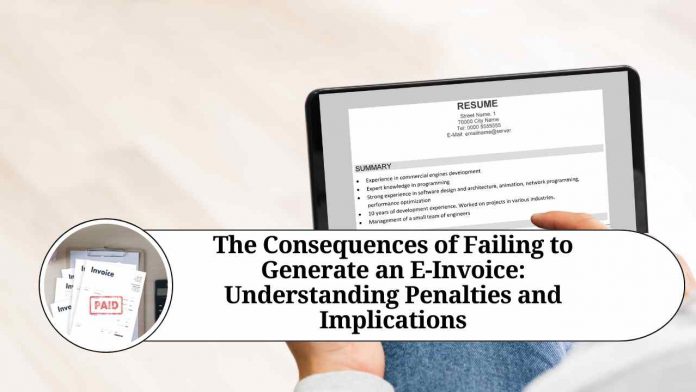Recent Updates on e-Invoicing:
10th May 2023
The CBIC’s latest action to support the government’s objective of shifting to a digital economy involves the introduction of the 6th phase of e-invoicing. Starting from August 1st, 2023, businesses with an annual turnover of ?5 crore or higher since 2017-18 will be obligated to generate e-invoices.
Introduction
In today’s digital era, electronic invoicing (e-invoicing) has become an integral part of modern business operations. With the aim of enhancing efficiency, reducing errors, and combating tax evasion, governments around the world have implemented e-invoicing systems. These systems require businesses to generate and submit electronic invoices in a standardized format. However, failure to comply with e-invoicing regulations can result in penalties and other serious implications. In this blog, we will explore the penalties associated with the non-generation of e-invoices and shed light on the importance of compliance.
Understanding E-Invoicing
E-invoicing refers to the electronic generation, transmission, and storage of invoices in a digital format. Unlike traditional paper-based invoices, e-invoices provide numerous benefits such as streamlined processes, improved accuracy, faster payment cycles, and reduced administrative costs. They also allow for seamless integration with accounting software and enable better data analytics.
Penalties for Non-Generation of E-Invoices
Governments worldwide are increasingly mandating e-invoicing to modernize tax systems and reduce tax evasion. Consequently, they have established penalties for businesses that fail to comply with these regulations. While the specific penalties vary from country to country, here are some common consequences for not generating e-invoices:
Financial Penalties: Non-compliance with e-invoicing requirements can lead to significant financial penalties. Governments impose fines based on the severity and frequency of the violation. These penalties can range from fixed amounts to a percentage of the invoice value or a combination of both. Accumulated penalties can have a detrimental impact on a company’s financial health and profitability.
Loss of Tax Benefits: Governments often incentivize e-invoicing by providing tax benefits to compliant businesses. By failing to generate e-invoices, a company may lose out on these benefits, including tax deductions, exemptions, or preferential tax rates. This can result in higher tax liabilities and a competitive disadvantage compared to compliant businesses.
Legal Consequences: Non-compliance with e-invoicing regulations can also lead to legal ramifications. Tax authorities have the power to initiate legal proceedings against businesses that consistently fail to generate e-invoices. Legal actions can result in lengthy court battles, reputational damage, and additional financial burdens arising from legal fees and settlements.
Business Disruption: Non-compliance with e-invoicing requirements can disrupt business operations. Governments may restrict or suspend non-compliant businesses from participating in public procurement processes, which can significantly impact revenue streams. Additionally, non-compliance can strain relationships with customers, suppliers, and partners who may require e-invoices for their own compliance purposes.
Reputational Damage: In an interconnected world where information spreads rapidly, the reputation of a business is paramount. Non-compliance with e-invoicing regulations can tarnish a company’s reputation, leading to diminished trust and credibility among stakeholders. Negative publicity resulting from non-compliance can have long-lasting effects on customer loyalty, investor confidence, and overall business growth.
Importance of Compliance
Compliance with e-invoicing regulations is crucial for businesses to avoid penalties and maintain a favorable position in the marketplace. By embracing e-invoicing, companies can streamline their financial processes, reduce costs, and improve their overall efficiency. Compliance also ensures that businesses contribute to the integrity of tax systems, fostering a level playing field for all participants.
Conclusion
E-invoicing has emerged as a powerful tool for businesses to enhance operational efficiency and comply with tax regulations. Failing to generate e-invoices can have severe consequences, including financial penalties, loss of tax benefits, legal ramifications, business disruption, and reputational damage. It is essential for businesses to recognize the importance of compliance and adopt e-invoicing systems to stay ahead in an increasingly digital and regulated business environment. By embracing e-invoicing, companies can not only avoid penalties but also unlock the benefits of a streamlined and transparent invoicing process.
Read more useful content:
Frequently Asked Questions (FAQs)
Q. What is an e-invoice?
An e-invoice refers to an electronic invoice that is generated, transmitted, and stored in a digital format, replacing traditional paper-based invoices. It is designed to streamline invoicing processes, reduce errors, and improve tax compliance.
Q. What are the penalties for not generating e-invoices?
Penalties for non-generation of e-invoices vary from country to country, but common consequences include financial penalties, loss of tax benefits, legal actions, business disruptions, and reputational damage.
Q. How are financial penalties determined?
Financial penalties for non-compliance with e-invoicing regulations can be fixed amounts, a percentage of the invoice value, or a combination of both. The severity and frequency of the violation typically influence the amount of the penalty imposed.
Q. Can failure to generate e-invoices result in the loss of tax benefits?
Yes, governments often provide tax benefits and incentives to businesses that comply with e-invoicing regulations. Failing to generate e-invoices may lead to the loss of these benefits, including tax deductions, exemptions, or preferential tax rates.
Q. Are there any legal consequences for non-generation of e-invoices?
Yes, non-compliance with e-invoicing regulations can result in legal actions initiated by tax authorities. Legal consequences may include court proceedings, reputational damage, and financial burdens arising from legal fees and settlements.
Q. How can non-generation of e-invoices disrupt business operations?
Governments may restrict or suspend non-compliant businesses from participating in public procurement processes, leading to significant revenue loss. Additionally, non-compliance can strain relationships with customers, suppliers, and partners who may require e-invoices for their own compliance purposes.
Q. How does non-compliance impact a company’s reputation?
Non-compliance with e-invoicing regulations can damage a company’s reputation. Negative publicity resulting from non-compliance can lead to a loss of trust and credibility among stakeholders, affecting customer loyalty, investor confidence, and overall business growth.
Q. Why is compliance with e-invoicing regulations important?
Compliance with e-invoicing regulations is essential to avoid penalties, maintain tax benefits, and ensure a favorable position in the market. It also contributes to the integrity of tax systems and creates a level playing field for businesses.
Q. How can businesses ensure compliance with e-invoicing requirements?
To ensure compliance, businesses should familiarize themselves with e-invoicing regulations in their respective jurisdictions, adopt e-invoicing solutions that meet the required standards, and keep up-to-date with any changes or updates in the regulations.
Q. Are there any benefits to adopting e-invoicing?
Yes, adopting e-invoicing offers several benefits, including streamlined processes, improved accuracy, faster payment cycles, reduced administrative costs, seamless integration with accounting software, and enhanced data analytics capabilities.




















